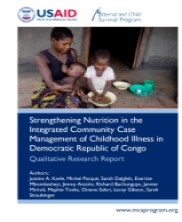In Democratic Republic of the Congo (DRC), child malnutrition rates are high. Recent DRC Demographic and Health Survey (DHS) data indicate that 43% of children under 5 suffer from stunting, 8% are wasted, and 23% are underweight. The majority (60%) of children 6–59 months old are anemic (hemoglobin <11 g/deciliter). Early initiation of breastfeeding and exclusive breastfeeding (EBF) up to 6 months old, introducing complementary foods from 6 months old, and continued breastfeeding are critical to children’s growth, development, and health. However, DHS data from DRC indicate that these practices are not optimal. The three main killers of children under 5—malaria, diarrhea, and pneumonia—remain a significant challenge, and only about 40% of children showing signs of fever, acute upper respiratory infection, or diarrhea are taken to a medical facility or a health professional for treatment. The prevalence of malaria among children under 5 is about 30%, and national health statistics indicate that 40% of all outpatient visits are for suspected malaria.
In DRC, the Maternal and Child Survival Program (MCSP) is working in collaboration with the Ministry of Public Health (MOPH) to strengthen the national integrated management of childhood illness (IMCI) and integrated community case management (iCCM) strategies, and supporting their rollout in Tshopo and Bas-Uélé provinces. Part of the IMCI strategy includes assessing the nutritional status of sick children and counseling mothers on how to feed their children. The iCCM guidelines primarily focus on the identification, treatment, and referral of children who have diarrhea, pneumonia, and/or malaria. The nutrition component of iCCM is limited to screening for malnutrition, which includes identification, referral, and subsequent treatment of severe acute malnutrition (SAM). It provides brief guidance on continuous feeding of sick children. The preventive aspects of nutrition within iCCM guidelines—including strengthening infant and young child feeding (IYCF) practices around breastfeeding, complementary feeding, and counseling skills of health providers at the community and facility level on IYCF—are weak, as the main focus of the approach is on treatment. This report was compiled by JSI in 2020.


